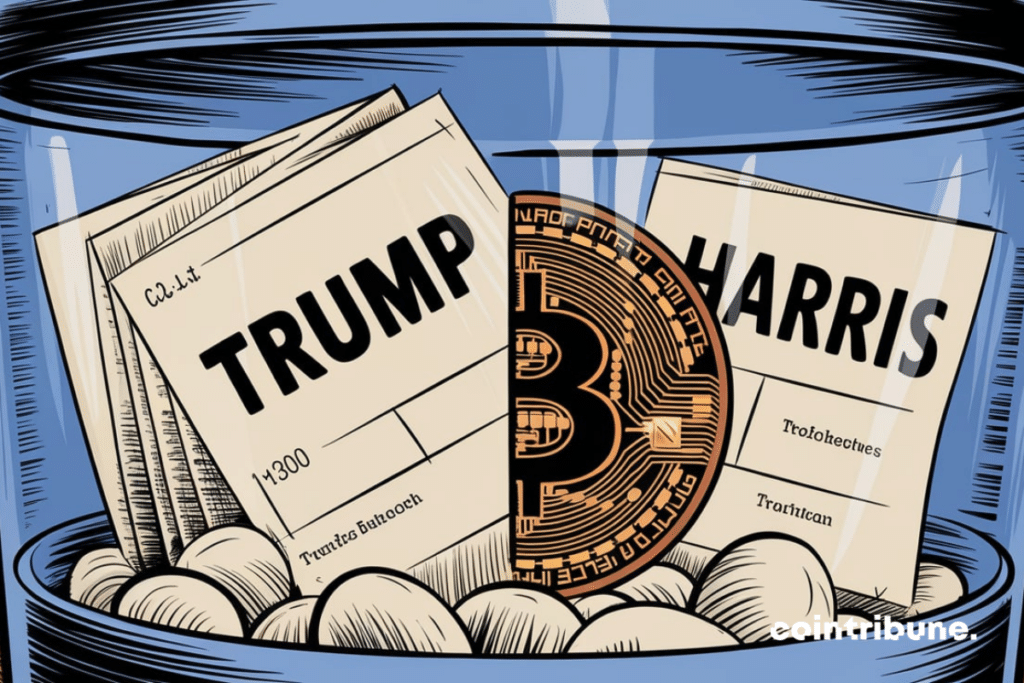US Debt Service
— Tracy Shuchart (𝒞𝒽𝒾 ) (@chigrl) October 20, 2024
The net interest bill exceeded the Defense Department’s spending on military programs for the first time, according to data from the Treasury Department and the Office of Management and Budget. It also amounted to about 18% of federal revenues — almost double the… pic.twitter.com/ysKSU9UNq8
A
A
Why Would A Victory For Trump Benefit Bitcoin?
Mon 28 Oct 2024 ▪
6
min read ▪ by
Getting informed
▪
Investissement
Summarize this article with:
Many signs point in favor of bitcoin, notably the surprise rise in borrowing rates in the United States.

Rates are rising instead of falling!
The 10-year US borrowing rate rose this Monday to 4.30% while we were at 3.65% just before the Fed lowered its benchmark rate. We have returned to the level of late July when rates began to decline in anticipation of Fed decisions.
The American presidential election explains this strange situation. But before giving the reason, let’s recall that American debt has reached $68 trillion (government, companies, and households).
Currently, the 30-year mortgage rate is close to 7%. The 10-year government borrowing rate is at 4.30% while that of multinational corporations is close to 5%. This gives us a rough average annual rate of 6% that Americans pay on the entire money supply in circulation.
That is a lot. These painful rates signal that banks do not believe that inflation is truly under control. They say: “we will only lend at a rate above inflation”.
However, official inflation has returned to 2.4%, which suggests that markets expect a return of strong inflation soon.
Trump and Tariffs
It is undoubtedly the American presidential election that is at the origin of the tensions over rates. Polls indeed suggest that Donald Trump will win on November 5.
A victory for the Republican camp would be inflationary because tariffs are at the heart of their economic program. Donald Trump wants a universal tax of 20% as well as a 60% tax on Chinese imports.
The former president even promises a tax of 100% on countries that would abandon the dollar as a reserve currency. The BRICS are therefore at the forefront, having reiterated their ambition to prioritize their national currencies at the Kazan summit.
These extreme tariffs would interrupt the deflation process, forcing the Fed to reassess its monetary policy. This is essentially the view of the director of the Institute of International Finance (IIF). “The hypothesis is that inflation and interest rates will be higher than in the absence of these tariffs”, stated Tim Adams on the microphone of CNBC.
Donald Trump defended his strategy by stating that “these tariffs will likely encourage companies to build their factories in the United States to avoid paying them”.
In any case, it is certain that such a policy would be inflationary in the short term. The United States is indeed the world’s largest importer (~$4 trillion per year).
Quantitative Easing?
The inflationary risk largely explains the reluctance of private banks to lower their rates. Perhaps they are also signaling their appetite for Quantitative Easing (QE)…
QE means that a central bank creates money ex nihilo to buy government bonds. This results in an increase in liquidity that encourages banks to lend more.
However, QE seems to be gently returning to the debate. The head of macroeconomic research at BNP Paribas Richard Barwell wrote earlier this month that “central banks will need to decide whether or not to revive Quantitative Easing policies during the next recession”.
The prospect of QE is also in vogue on the Chinese side. Our article on the subject: “China – A QE in the pipes? “.
It should not be forgotten that QE greatly relieves public finances. The reason is that central banks return to their government the interest collected on the bonds they buy via QE.
This is very important when we know that interest on debt represents 18% of US tax revenues:
The budget situation is such that Elon Musk proposed cutting public spending by $2 trillion. This is almost equivalent to the US budget deficit.
Bitcoin Lurking
It is not just interest rates that have been rising lately. Bitcoin is boosted by the likely election of Mr. Trump. The reason being that he has committed to creating a “strategic reserve of bitcoins”.
This will mainly consist of not selling the 200,000 BTC held by the US government, although the possibility of acquiring more is also on the table. Republican senators have put together a bill foreseeing the purchase of one million BTC…
Such a outcome, after having dragged bitcoin through the mud for so many years, would have global repercussions. How many countries will also start accumulating bitcoins if the United States makes it their reserve currency?
All this to say that a resurgence of inflation coupled with a return to money printing to ease the debt burden would be bullish for bitcoin. Much will depend on the geopolitical negotiations awaiting Donald Trump in 2025. The negotiations look set to be difficult with the BRICS.
In the meantime, multinationals are starting to sniff out the good opportunity. After Microstrategy and Tesla, Microsoft could be the next multinational to place its treasury in bitcoin. Shareholders will vote on the matter in December. Knowing that BlackRock is the second largest shareholder of Microsoft…
2025 will be a very interesting year for bitcoin. The $100,000 finally in sight?
Maximize your Cointribune experience with our "Read to Earn" program! For every article you read, earn points and access exclusive rewards. Sign up now and start earning benefits.
A
A
Bitcoin, geopolitical, economic and energy journalist.
DISCLAIMER
The views, thoughts, and opinions expressed in this article belong solely to the author, and should not be taken as investment advice. Do your own research before taking any investment decisions.